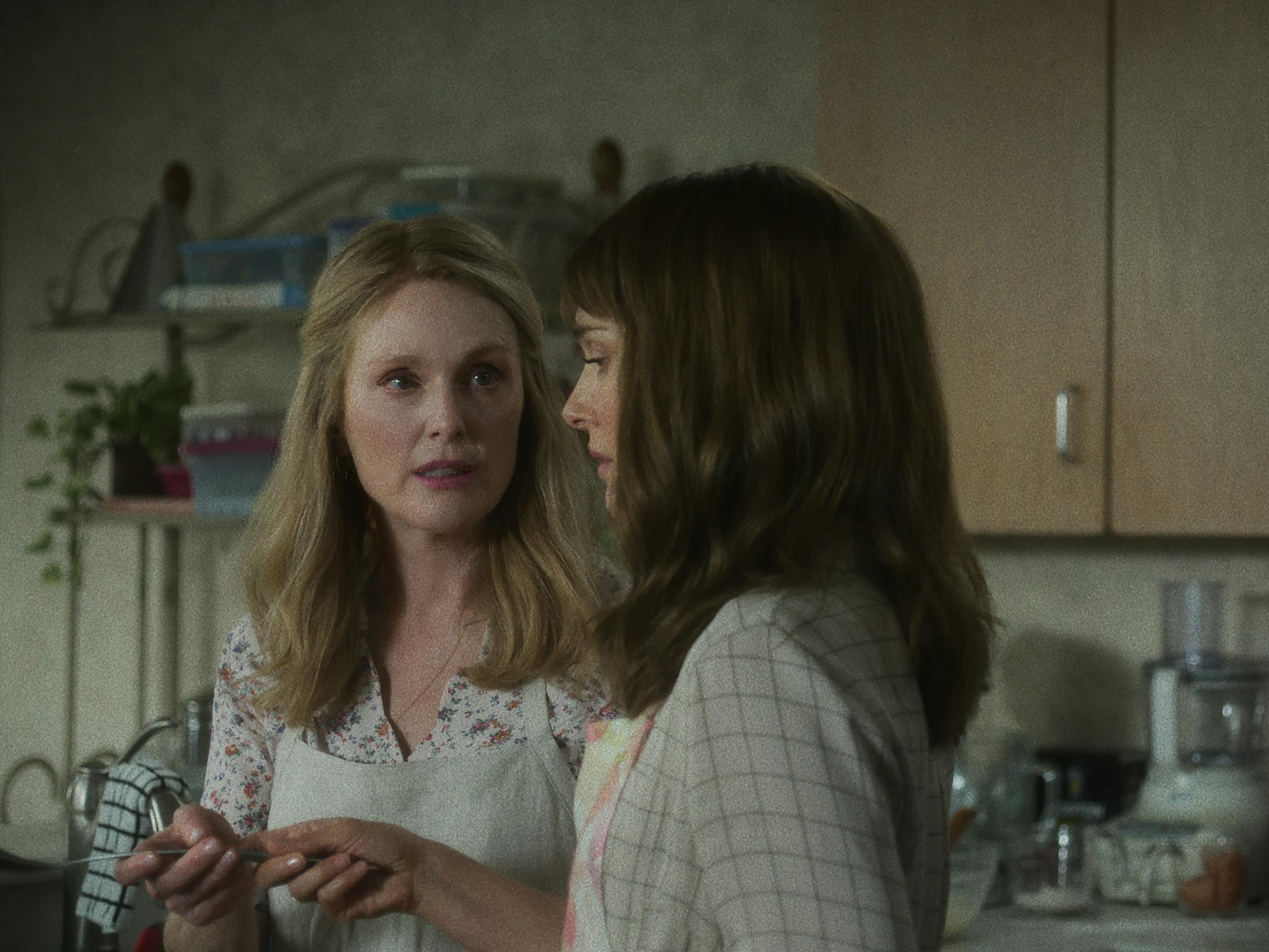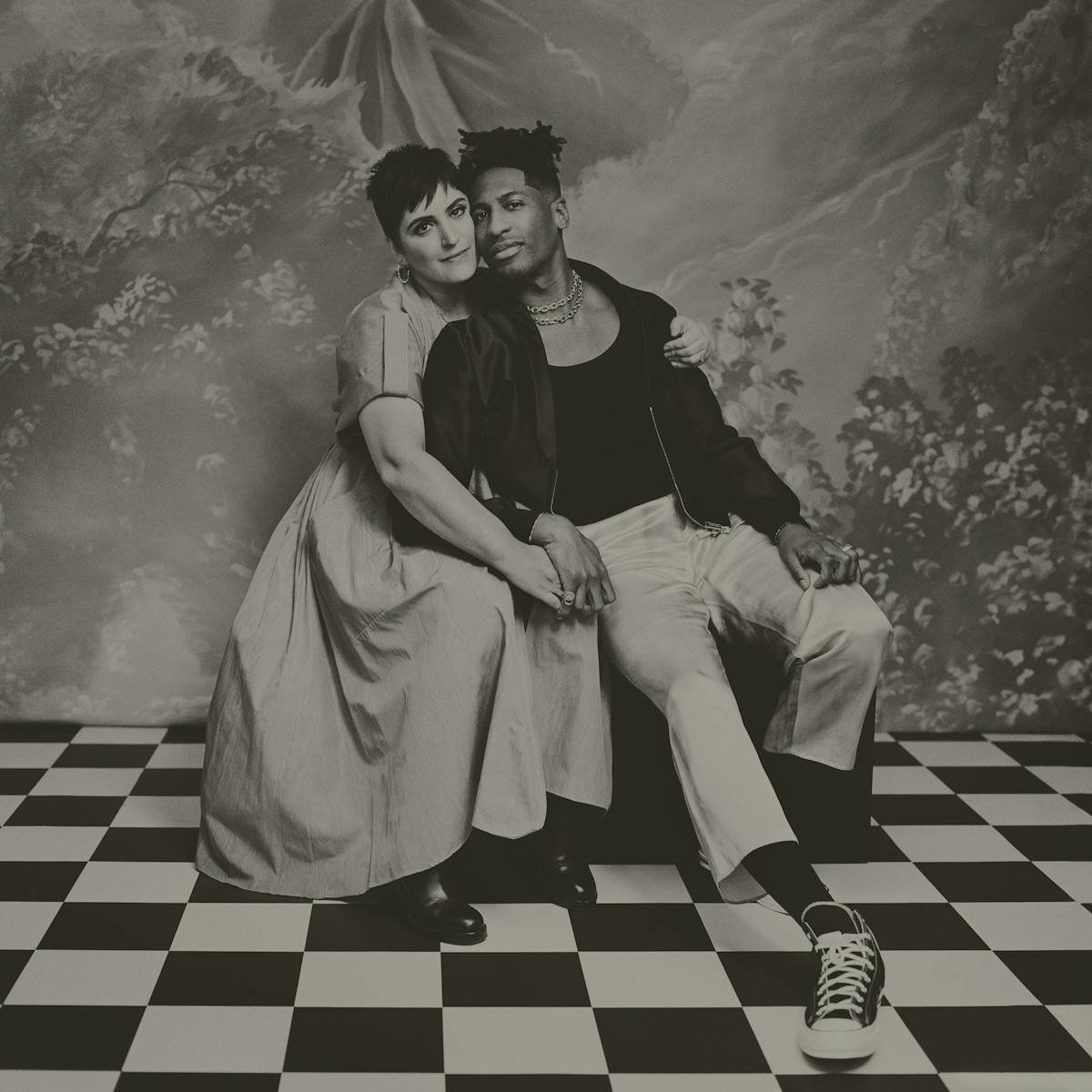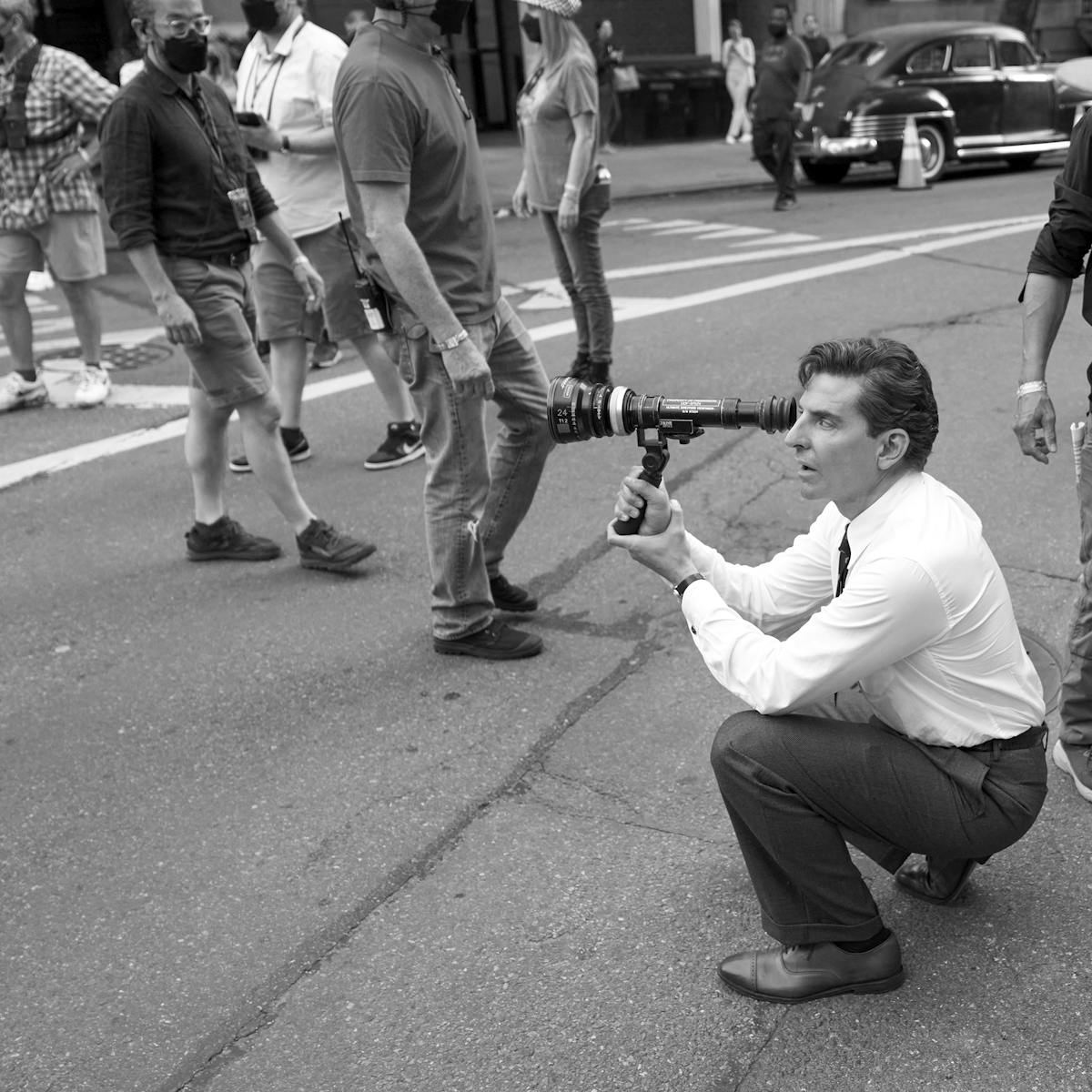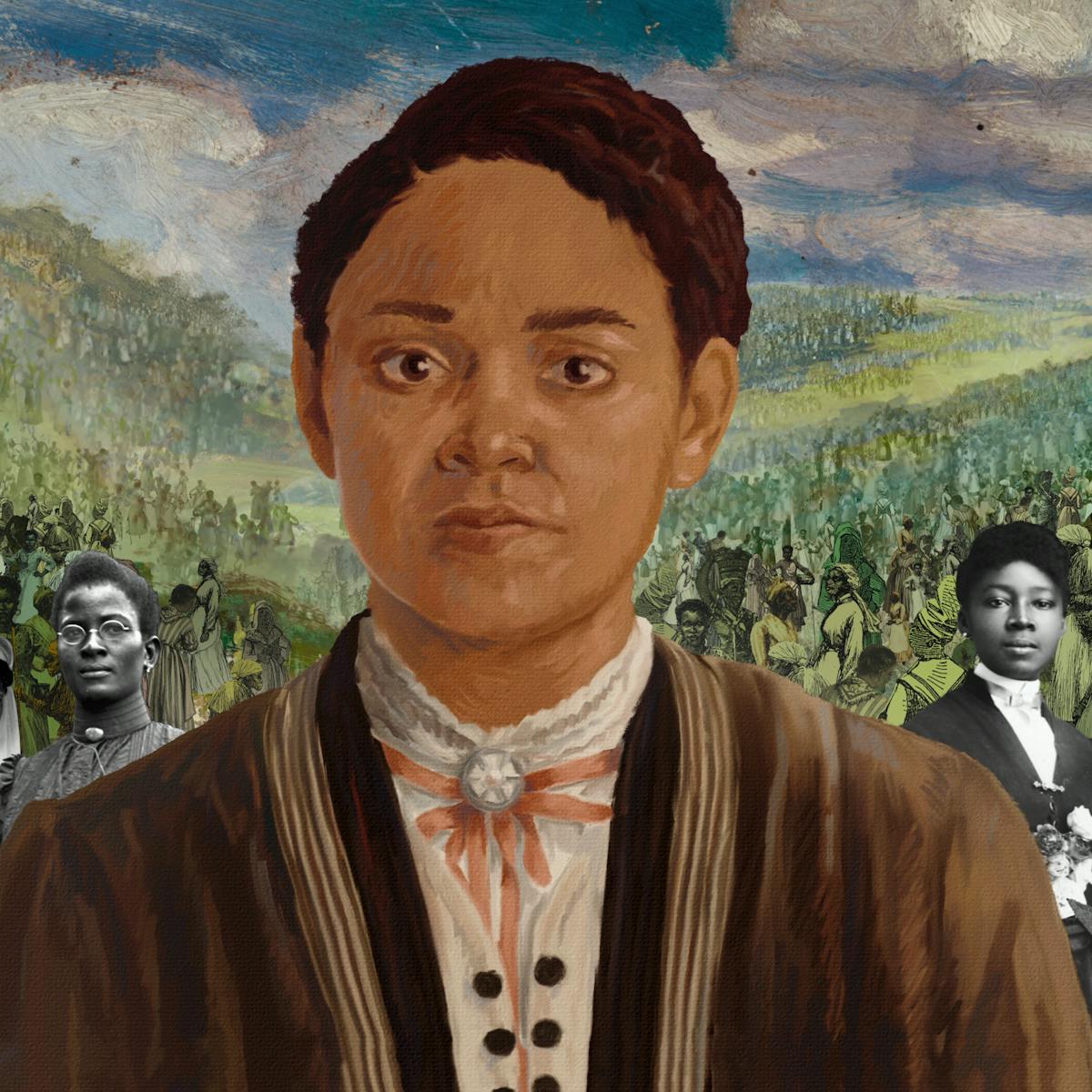May December invites visceral reactions — laughter, repulsion, heartbreak — but its truth lies in how these warring emotions rub up against each other.
In Todd Haynes’s latest melodrama, TV actor Elizabeth (Natalie Portman) descends on a placid Savannah, Georgia community to study Gracie (Julianne Moore) in preparation for an upcoming role about the sordid early days of her relationship with Joe (Charles Melton) — when the former was 36 and the latter 13. Despite their troubling origins story, when May December opens twenty years later, Gracie and Joe appear to be the picture-perfect couple, with Gracie baking a bounty of pineapple upside-down cakes and Joe grilling an obscene amount of hot dogs for a celebratory get-together at their Tybee Island home. Yet Elizabeth’s probing questions reveal that the strength of their union is predicated on their never having fully considered the criminal nature of their origin story.
Samy Burch wrote the script for May December, which marks the writer’s impressive feature debut. She ingeniously tangles seduction and predation, performance and obstruction, right and wrong, navigating sensitive content and creating a metacinematic lens that begs active participation from its audience. In addition to writing a few shorts, Burch previously worked in casting departments, an experience that informed her keen grasp of nuance and character in May December: “When I’m writing, I try to hear these characters’ voices in an honest way, and then it just all springs from them,” says Burch, who worked with her husband Alex Mechanik on the story.
“There isn’t a big one-element takeaway,” she adds. “If anything, it’s just that everything is so complicated. There are the ripples of that as an audience member, as Elizabeth is trying to play this role, and even for Joe, who lived this experience. It’s really hard to get your grasp on ‘the truth.’ I hope that people have conversations about identity, celebrity, denial, and tabloid culture. There’s a lot to talk about.”
An edited version of the conversation follows.

Natalie Portman, Julianne Moore, Charles Melton, and Samy Burch
Brookie McIlvaine: May December was shot in 23 days. Was the script changed at all during such a fast and furious filming process?
Samy Burch: Amazingly, it really didn’t seem to; nothing really got cut that I could tell. It was due to Todd being so confident in the way he shoots everything, and obviously all the amazing producers, that it was economical. There was no phone call like, “Oh, we got to cut the whole second act,” or anything. It’s so impressive what both Julianne and Natalie had to do in an amount of time that completely mirrors what their characters are doing, where Natalie has to absorb this character and play it back to her in real time. I don’t think that could have been done successfully, especially in that amount of time, with no rehearsal, without actors who are of their incredible caliber.
Was there a character that served as an entry point for you into such a thorny, layered story?
SB: Everything really started with Joe’s character, and then everything else built out from there. He really is the heart and the heartbreak of the story. He’s ultimately a caretaker. He’s a really good father, he cares for the butterflies, we get the sense that he cared for his little sister growing up, and we see the ways in which he’s been trained to be a caretaker of Gracie. And, ultimately, when Elizabeth gets to him, it’s not when she’s being seductive or when she’s being a good listener, it’s when she needs help with her asthma nebulizer. I think that’s just a key component of who he is and what he has had to do.
This marriage has gone through quite a lot, and there’s a lot of strain there and a lot of denial. We’re so many years into this thing and they’re at this pivotal moment of becoming empty nesters, which normally happens when both parents are Gracie’s age, like late fifties. And for that to be where Joe is at in his life, I just think it’s a very fertile time.

Gracie (Julianne Moore) and Elizabeth (Natalie Portman)
Can you tell me about writing a movie within a movie and why performance was the lens through which to understand this specific story?
SB: I always knew I wanted to set it in the present, well after the tabloid event, and that just seemed like a way to bring some humor, maybe some of it more satirical, into the story. Bringing in this Hollywood machine — it of course becomes so much about that and the way that we process these traumatic true crime events and feel the need to recreate them over and over. But the meta element — it was the never-ending ripple. I got sent a casting link for those little boys reading to audition for Elizabeth. They would say, “Hi, my name is” whatever, and then it’d be the scene, and then they’re just saying a different name and a different age. Those moments continued to be funny and strange.
How did you achieve such an effective tonal mix in the script?
SB: I’m really drawn to dark things and I just always feel there has to be humor, even if it’s because it’s so uncomfortable or because it’s just funny in a dark way. That is my instinct and what I like as an audience member. So I think some of the way the humor presents itself in the script is . . . there’s a tonal briskness. It just comes from the way that people can be. Natalie is so funny in the movie, in those moments where she chooses to be so fake nice, and we can see in her eyes that she doesn’t care. It’s so funny.
Dealing with an actress who’s come to this town to have this experience underlined, I think that just naturally leads to humor because there’s something a bit recognizable about it and we’re able to see what she’s doing more clearly than she is. I always think that disconnect can be funny, though it is a delicate balance. The subject matter, the heart of it, is so serious and we wanted to really make sure that was protected so that none of the jokes are at Joe’s expense. It’s trying to keep it in balance.
How do you think someone should approach watching this movie?
SB: I think that, and this is true of all Todd’s films, you, as an audience member, have an active participation. It doesn’t spoonfeed you what you’re supposed to think, and it’s not punitive or anything. But I am afraid when I say that, that people think the binary is, “Oh, was this a good thing to do?” It’s not as simple as that. It’s more that minute to minute you don’t exactly know how to feel or who to trust, and that ill of ease is coming from these people, many of whom are lying to themselves or their partners or neighbors. Even the innocent ones are still trafficking in a lot of denial, so there’s just a lot of peeling back of the onion to see where it all ends up. But I think it’s also very fun to watch. It’s funny, it’s unsettling, but it doesn’t feel like horror or torture or anything like that. It’s a blend of all of the things.

Joe (Charles Melton)
I love how subtlety and melodrama are at once warring and feeding each other. How did you strike this balance without the drama feeling gratuitous?
SB: I think the music and the framing that Todd brings are just so brilliant and thoughtful and bold. There is such natural melodrama with this domestic, female-driven [story]. It’s a showdown. There’s something when I watch the movie and the performances that feels really honest. Melodrama really encompasses a lot, and on one side of the spectrum it’s all facade, but I don’t think that’s where we are. There’s just this mix that I love watching, and it’s so specific and so taut as well. It’s hard to totally describe.
You’ve worked extensively in casting. Did that play into how you wrote the script of May December at all?
SB: Sometimes there are some scenes that you’re like, “This doesn’t need to be in the movie. This is not a good part and it’s going to get cut.” And then it goes out and a hundred people audition, and then 10 get a callback, and then one gets it and they go on set and they shoot — and then they get cut out and you have to call them. That’s something I look at with a fine-tooth comb. Does this [scene] need to be in the movie? I should double-check, but I’m pretty sure not one part got cut that was shot. Even the one-liners — and some of them are really funny — that come on for one second, they had a reason to be there.
Ultimately, I love actors, as much as it might not seem to be the case based on Elizabeth’s characterization. But that’s a very exciting part of this process to me: writing roles that are appealing for actors, that let actors show something they haven’t done or just feel like [the role is] meaty for them. That’s a big part of what drives me as a writer.




